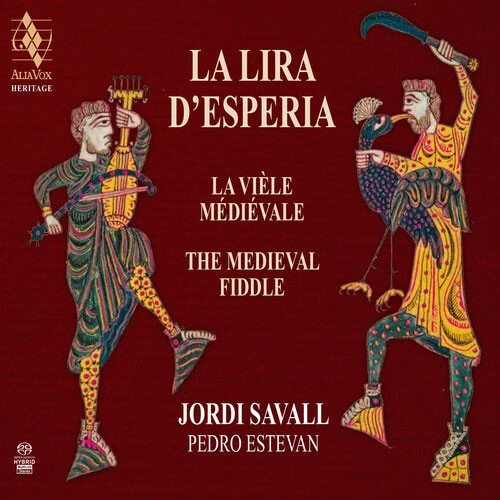"The Medieval Fiddle" On SACD!
"The fiddle with its sweet melodies,
sometimes dreamy, sometimes joyful,
sweet notes, delightful, clear, well turned.
The listeners rejoice and make merry." -Arcipreste de Hita, ca. 1330
Jordi Savall attempts to recreate a certain art of sounding the bow over time. Above all, this program is a tribute to all the jongleurs and poet-musicians who were convinced that through music the soul could be moved to boldness and valour, magnanimity and generosity, all qualities that dignify the good governance of peoples.
The earliest string instruments described in Greek mythology, the lyra and the kithara are among those most frequently cited by the Roman poet Virgil (70-19 B.C.). According to Greco-Latin tradition, Apollo invented the lyre, while Orpheus invented the kithara.
From ancient times, there have been constant references to the extraordinary power and effects that music and musical instruments have over people, animals and even plants and trees. Such were the characteristic attributes of Orpheus, whose magical gifts as a musician inspired one of the most mysterious and symbolic myths in Greek mythology. With its origins lost in the mists of time, this myth gradually took on theological proportions, giving rise to a vast and often esoteric body of literature. Orpheus is the musician par excellence, whose enchanting melodies charmed wild beasts, caused trees and plants to bend down before him and soothed even the fiercest of men.
Hesperia (Esperia in Italian) was the name given in Antiquity to the two most westerly peninsulas, the Italian and the Iberian. According to the Greek philosopher Diodorus, this was also the location of the Hesperides, or Atlantis, a wondrous garden where the magical Golden Apples (...oranges or lemons?) were to be found.
And it is in Iberian Hesperia that we find the earliest references to bowed instruments. Unknown during Antiquity and in the early Middle Ages, the use of the bow to draw sound from string instruments, according to one of the most likely hypotheses, seems to have been introduced into Europe via Arabo-Islamic countries. We should not forget the high degree of sophistication achieved by Arab and Byzantine cultures by the tenth century and the importance of the cultural exchanges - often as a result of conflicts - that existed between East and West. It is not surprising, therefore, that the earliest European representations of bowed instruments are to be found in 10th century Mozarabic manuscripts of Hispanic origin: Beatus de Liebana (c. 920-930) and in various Catalonian manuscripts, including the Bible from the Benedictine abbey of Santa Maria in Ripoll.
The medieval fiddle thus emerged as one of the favorite instruments of the troubadours, jongleurs and, in particular, of the nobility who enjoyed playing the fiddle when their martial pursuits were over, as may be seen from the many references in the literature of the time and from iconographical sources, such as the seal of Bertrand Il, Count of Forcalquier (Provence), which on one side represents him armed and on horseback, and on the other playing the fiddle. These noble musicians were known as nobles jongleurs to distinguish them from the professional jongleurs, their musical activities being for pleasure rather than a means of earning a living; music for them was one of the exercitia liberalia (noble or liberal pursuits). In medieval times, therefore, the fiddle (along with the harp) was indispensable to courtly and lordly life.
Features
- Super Audio CD
- SACD Multi-Channel SACD Layer
- SACD Stereo SACD Layer
- This Hybrid SACD contains a 'Red Book' Stereo CD Layer which is playable on most conventional CD Players!
- SACD Mastering: Manuel Mohino
- Made in Austria
Musicians
| Jordi Savall | llyre, vielle, rebab |
|---|---|
| Pedro Estevan | percussion |
Selections
I
- Rotundellus - Trad. Galicia - CSM 105
- Lamento - Trad. Adrianopoli, Séfarade
- Danza De Las Espadas - Trad. Algeria, El Kantara
- Istampitta: In Pro - Italy : Trecento mss.
- Saltarello - Italy : Trecento mss.
II
- Ritual - Trad. Algeria, Zendani
- El Rey De Francia - Trad. Smyrne (Izmir), Séfarade
- Danza Ritual - Trad. Galicia - CSM 353
- Istampitta: La Manfredina - Italy : Trecento mss.
- Trotto - Italy : Trecento mss.
III
- Alba - Trad. Castelló de la Plana
- Paxarico Tu Te Llamas - Trad. Sarajevo, Séfarade
- Danza Del Viento - Trad. Algeria, Berber
- Istampitta: Lamento Di Tristano - Italy : Trecento mss.
- Saltarello - Italy : Trecento mss.
IV
- Ductia - Trad. Galicia - CSM 248



 Turntable Accessories
Turntable Accessories Headphone Accessories
Headphone Accessories Cable Accessories
Cable Accessories Vinyl Accessories
Vinyl Accessories Compact Disc Accessories
Compact Disc Accessories







